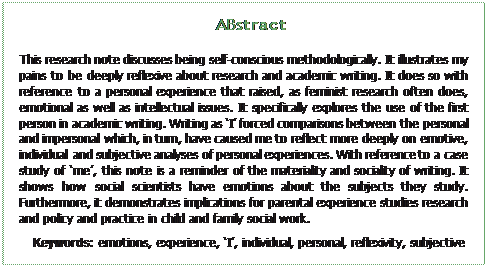 |
Reflecting on doing criminological research
|
|
|
|
REFLECTING ON DOING CRIMINOLOGICAL RESEARCH
The importance of reflexivity
Research findings and conclusions are not ‘things’ that are lying around waiting to be picked up by the criminologist; as we have articulated throughout this chapter, they are the outcome of research decisions which are taken at different stages (and of the factors that influence these, including factors external to and out of the control of the investigator). As Peter Francis articulates in Chapter 2, research design is an exercise in compromise whereby the investigator seeks to trade off the strengths and weaknesses of different methods when making con- nections with research questions. But it is not possible to escape the reality that
even the best laid plans and designs have to be actualized in social, institutional and political contexts, which can have a profound effect on the outcome of research. Giving recognition to this is important on three counts: first, it allows some assessment to be made of the likely validity of conclusions; second it ensures we are reminded of the messiness of research; and third it encourages us to reflect critically on what comes to pass as ‘knowledge’, how and why. This latter aspect is one hallmark of critical social research. The contribution of reflexivity to the assessment of validity and also to critical social research will be discussed later.
Research as a social activity
A number of assumptions underpin this particular concern about doing criminological research. The first is that research is a social activity. Criminology is not like those physical sciences in which researchers study and engage inanimate objects. In the main, you will be concerned with individuals, and social research is a form of interac- tion. You should easily recognize this because one influential theoretical approach within the discipline – interactionism – emphasizes that what comes to be recognized as ‘criminal’ can be the outcome of interactions in the processes of the criminal justice system. What therefore, comes to pass as ‘knowledge’ is also the outcome of interac- tions in the research process.
Research and emotion
Social scientists have tended often to emulate the pure sciences in striving for objec- tivity in their research. This has meant that emotive writing tends to be the exception rather than the rule. Writing in the first person is often actively discouraged though when you are engaged in research for a dissertation or PhD this seems an odd way to proceed. Pretending we are not the author through a thinly disguised use of the term ‘the researcher’ can make your writing feel stilted and laboured. One of us – Davies (2012) – has written about the use of the first person in academic writing. See Box 1. 7 for an abstract of this article.
 |

Research and politics
Criminological research is not just a social activity; it is also a political activity. It involves some form of relationship between the subjects of research and the investi- gators, but there are also others who have an interest. The range of stakeholders typically includes sponsors of research, gatekeepers who control access to sources of data and the various audiences of research findings. These audiences include the media, policy-makers and professionals working in the criminal justice system, politi- cians and academics. Gatekeepers may have a formal role and legal powers to restrict access (for example, a prison governor) or they may be able to deny access by infor- mal means (for example, by continually cancelling appointments). Sponsors of research include government departments, the Home Office, the Ministry of Justice, institutions of criminal justice, such as the police and charitable bodies or pressure groups such as the Howard League or Prison Reform Trust. Each of these stakehold- ers has interests to promote and to protect. Also, each has differential levels of power with which to promote and protect such interests. The exercise of such power is ingrained in the research process, from the formulation of problems through to the publication of results.
|
|
|
Research and politics connect in differing ways. For example, politics can have an
impact on the doing of criminological research and also on its outcome. The kind of research which is funded and the ways in which research problems and questions are framed are very much influenced by sponsors. Often, they are interested in policy relevance (in their terms) and insist on a formal customer–contractor relationship in which ‘deliverables’ are clearly specified. Research is often also dependent on
whether gatekeepers give access to subjects – or other data sources – in the first place.
A second way in which politics and research connect is in the differing ways in which the activity of research and its outputs contribute to politics. One impor- tant way in which this occurs in criminology is in the conduct of policy-related research. Such research can take a variety of forms but one which has contributed substantially to the formulation and implementation of criminal justice policy is evaluation research. Sometimes this kind of work is known as administrative criminology because of its contribution to the administration and management of the criminal justice system. However, criminologists who represent a critical approach see such work not solely as contributing to policy, but, more impor- tantly, as also justifying policy. In this sense, they look on policy-related research as playing a political role in mechanisms of social control and not as benign, value-free contributions to administration and management. David Scott, in Chapter 6, explores the politics of doing criminological research from a critical criminological perspective, while Rob White, in Chapter 22, explores evaluation research.
|
|
|


